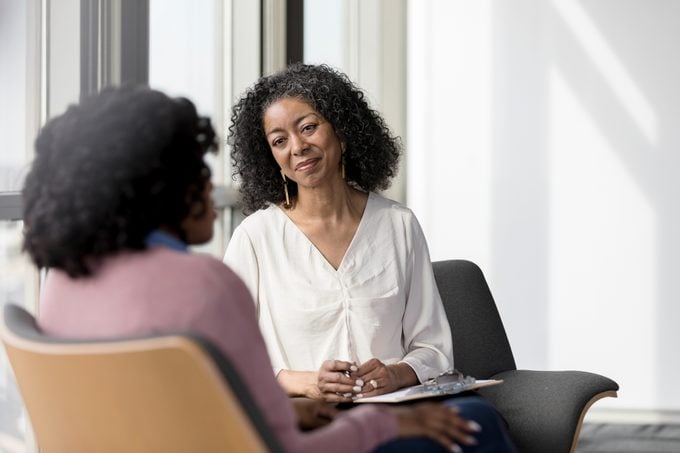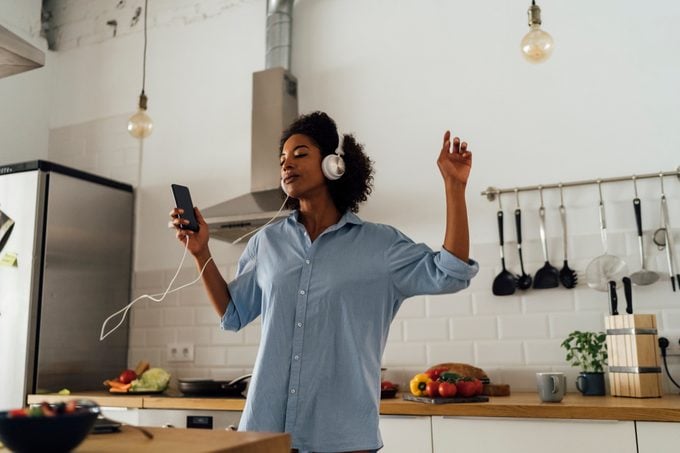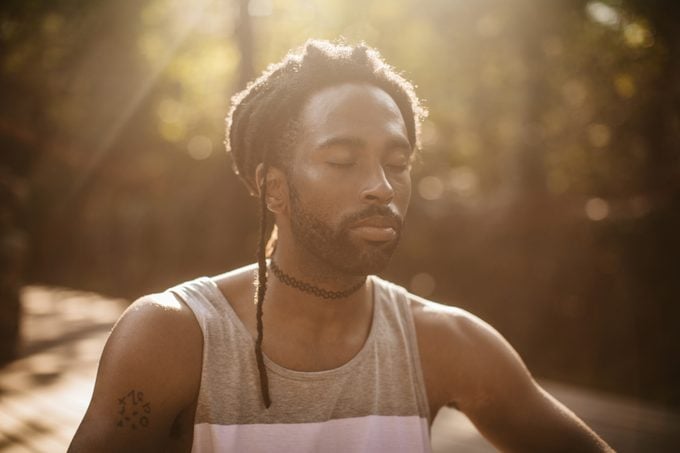7 Tips from Black Therapists on Coping with Anxiety Due to Covid-19 and Racial Trauma
Updated: Mar. 16, 2022
Black therapists share their top tips for dealing with the anxiety and stress from Covid-19 and racial tensions, from Beyoncé to exercise.
Our editors and experts handpick every product we feature. We may earn a commission from your purchases.

The Black mind is under siege. Faced with a double dose of uncertainty—the disproportionate threat of being killed by cops and an increased possibility of death from Covid-19—Blacks are turning to an unfamiliar form of help: psychotherapy.
(Here are 5 studies that show racism in health care is real.)
According to a 2017 report from the American Psychiatric Association, while mental illnesses affect Blacks at similar rates to the rest of the general population, there are disparities, with only one in three receiving proper mental health care.
“Our world is literally caving in,” says S. Tia Brown, a Brooklyn, New York-based therapist and life coach. “There are always going to be disastrous things that happen, [but] rarely are you getting hit with multiple things simultaneously, and we don’t know how they’ll end or when they will [end].”
It’s no wonder then that online therapy is in demand. But with 30 million Americans on unemployment, therapy can be cost-prohibitive. (Experts also warn that online therapy is not for everyone like those who have serious psychiatric illnesses or have suicidal thoughts.)
Still, there is plenty one can do to help keep mental health in check. We spoke with four Black therapists who shared what they’re doing and how they’re advising their clientele, virtually, to combat various anxieties. (Here are some tips to deal with coronavirus-related stress.)
Go to your happy place
Self-care doesn’t have to be rote. Brown says she lets her vibe dictate her me-time. “Some days I know I might need to exercise, some days I might need to talk to friends, some days I might need to just veg out and watch movies that make me laugh,” Brown says. “At the beginning of [the pandemic], that’s all I did, was watch silly movies.”
For her, that meant “all of the Wayans Brothers movies,” and Adam Sandler’s greatest hits, too. There were plenty of FaceTimes with friends and family. But when that no longer brought her joy, Brown took a road trip to Maryland for a change of scenery and to let loose with family including nieces and nephews. (Here are 10 car essentials for the coronavirus pandemic.)
“Children are just chaotic and funny and honest. So, for me, that is a happy-booster,” she says. Just make sure your happy-boosting with loved ones follows the CDC’s guidelines for social activities. (Here are some tips for visiting grandparents or other older people.)
Avoid binge-watching the news
All the therapists we talked to agreed: It’s a good idea to limit watching the news—with its screaming headlines of Covid-19 fatalities and graphic police brutality—to keep mental health in check.
“I have to protect my energy,” says Lisa Daniels, a licensed psychology associate at Howard University in Washington, D.C. “I don’t want to see images of us being killed, of us being put down. That has an impact on us, on one’s well-being, spirit, and self-worth.”
Instead, Daniels says she’ll read the news, or get lost in a good book like the one she’s currently engrossed in, bell hooks’ bestseller Rock My Soul: Black People and Self-Esteem. “I feel like I have to re-learn the history that wasn’t taught to me,” says Daniels.

Listen to music (and dance)
There’s nothing like dancing around to a favorite song to lift your spirits. For Daniels, the song “Bigger” by Beyoncé does the trick.
“Just those lyrics: ‘If you feel insignificant/you gotta think again/you better wake up/because you’re part of something way bigger.’ It inspires me. I know what I have in my spirit, in my soul, I know that God put me on this earth to be a healer and inspire others, and inspire myself.”
She also gets her 8-month-old baby girl in on the act. “I sing those lyrics, and I speak it to my daughter.”
(Learn more about the incredible health benefits of music.)
Get up and move
New York City-based marriage and family therapist Gidget Smith has seen her client load increase since the beginning of the Covid-19 crisis, and her days are packed with Zoom calls. (Here are 7 therapist tips to make your video calls better.)
But before she sits down with her clients, she laces up her running sneakers. “I run at least four times a week, 30 minutes to an hour,” says Gidget Smith, calling it a part of her “daily routine of consistent sleep and exercise. (Prefer going on a walk? Here are the best walking shoes for your feet.)
“Self-care is essential in my everyday life and the life of my clients. As a [person of color], we are not taught to care for ourselves but care for others. We must stay the course to fight the injustices peacefully and strategically.” (Beware of the 9 signs you’re not taking care of yourself.)
Sit still and meditate
Taking a comfy seat in a quiet space may be all you need to feel grounded and zen-like—especially if you’re a working parent. “Being a new mom,” says Daniels, “it’s challenging to find the space, that’s why I try to use meditation, deep breathing, basic relaxation, and grounding techniques when my baby’s sleeping.” (Here’s how a BIPOC mental health podcast has helped this person through the pandemic.)

Speak to a higher power—if you believe in one
Imagine losing two family members to coronavirus and then watching as the Covid-19 net draws even tighter around you. Your live-in niece, a healthcare worker, falls ill. Then your spouse.
That was the horrifying reality for June Ann Smith, an associate professor in the department of counseling and development at Long Island University Post in Brookville, New York. Her husband, a fellow therapist and evangelist, developed blood clots in both lungs and spent seven weeks on oxygen.
“I have faith, and I believe that God is in control of our lives and that praying to him and taking hope in his promises can reduce anxiety, so I found that very helpful during this period,” says Smith. Her husband survived and has since returned to work.
“I coped through all that stress by trusting that I could depend on the divine power of God.” If you’re a non-believer, maintaining a positive mantra can also be beneficial. “Be at peace,” says Smith, “be optimistic and believe that this is an event, and it will end one day.” (This is what optimistic people do every day.)
Consider online therapy
If it seems that no matter what you do, the stressors of Covid-19 and racism are too heavy to bear, it’s likely time to try online therapy. All therapists we interviewed said they have video chatting capabilities. While Smith says a face-to-face session builds a better therapeutic relationship, all four therapists agree there are many benefits of online therapy.
“[There is] flexibility, it’s less expensive than face-to-face therapy,” says Smith. It’s time to drop the stigmas of getting mental health help, once and for all, says Brown. “Therapy is a tool,” she says. “It’s a resource that you can use for a short period and come back to as you need it. You shouldn’t feel embarrassed. You shouldn’t feel less than because you want to talk to someone.” (Here are tips for finding a therapist in general, as well as how to find a Black therapist.)
If you or someone you know has had thoughts of self-harm or suicide, contact the National Suicide Prevention Lifeline (1-800-273-8255), which provides 24/7, free, confidential support for people in distress.




















